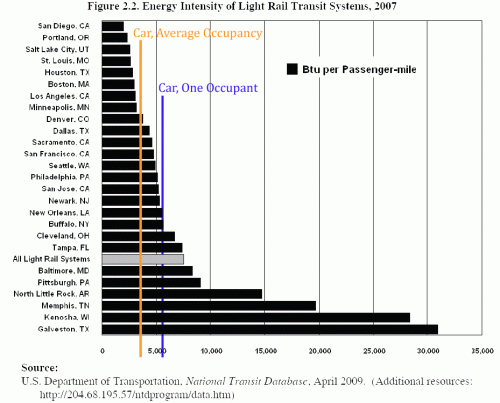Light Rail Uses Twice the Energy as Driving
One of the justifications for diverting highway money to ridiculously expensive light rail systems is that light rail supposedly reduces energy consumption. Really? This is via the most recent report from the DOE's Transportation Energy Book, as highlighted by the Anti-Planner (click to enlarge):
The figures for cars are from tables 2.12 and 2.13 of the same report. Even the best light rail systems are not substantially more efficient than cars, and this gap will likely continue to close, as it has for years, as cars get more efficient.
A Note on Freight: By the way, passenger rail promoters in the US always point to the Europeans as having a better rail system. But while the Europeans put more of their passengers on rail than does the US, they put less of their freight there. I would argue that the US system is much more "green", as the differences in energy use between a ton mile of freight on road vs. rail is much larger than the difference in energy use of a passenger mile on road vs. rail. And besides, from a lifestyle standpoint, would you really want more freight on the roads? (This is a real tradeoff -- unless one spends the absurd amount of money to build two separate systems, a rail network can be optimized for freight or passengers -- the two do not coexist very well on the same tracks).
Postscript: Just to head off the obvious rhetorical battles -- the incremental energy efficiency of moving one driver to a light rail rider of an existing system is very high. The car consumption goes away and the train does not incrementally increase its energy use much with one more passenger. So at the margin, it is correct when someone tells you that it saves energy to shift your commuting to an existing light rail line. However, it does not make sense, from an energy perspective, to build a light rail line in the first place. The investment is too high, the energy savings are negligible or non-existent, and the operating cost are so high that light rail tends to crowd out bus operations that help the poor. As I have written before, for every light rail system I have checked, the cost to build the system is enough to buy every daily rider a Prius and the operating deficit enough to keep every one of these Prius's filled with gas.
Update: I further understand that cars in the city likely have lower gas mileages than these averages, particularly for commutes that might be substituted by light rail. But light rail is sold as if it is substantially more energy efficient, and it really would have to be orders of magnitude more efficient to justify the capital costs that are so much higher than for an equivalent capacity of roadway. The efficiency is just not there.
